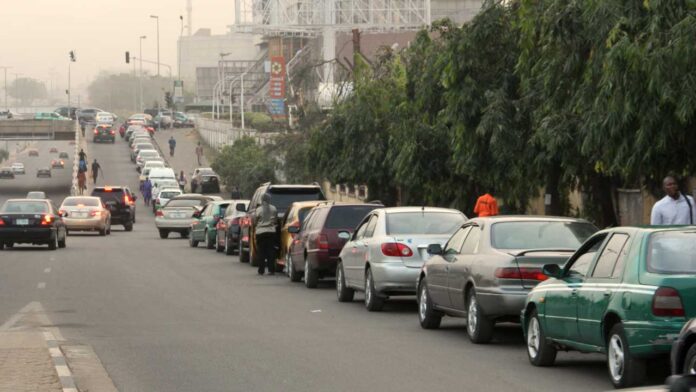Abuja still in fuel scarcity grip while supply eases in some states
By Jeph Ajobaju, Chief
Civil service town Abuja remains in the grip of fuel scarcity, a week after the squeeze eased up in some parts of the country, including Lagos, home to the largest number of vehicles and consumer of more fuel than any other state.
Fuel supply has returned to somewhat normal after six weeks of mayhem caused by the importation of adulterated products that damaged vehicles and triggered scarcity and high pump price with a multiplier effect on the prices of all goods and services.
Pump price is back to between N162 and N165 per litre in most fuel stations in Lagos. But transport fare that soared during the scarcity remains up on most routes.
Transport operators cash in on high passenger demand to make more money to foot their own rising living costs. Only BRT, a joint government/private operation, has not raised fares.
Lingering fuel scarcity in Abuja makes the situation worse for individuals and for businesses, despite the concentration of federal power and the presence of the headquarters of the Nigerian National Petroleum Company (NNPC).
There are still long queues at fuel stations where motorists spend several hours to fill up their tanks. The queues spill onto roads and cause avoidable traffic jams.
__________________________________________________________________
Related articles:
Higher transport costs raise food prices
Bakers warn bread price will double – on higher costs
Diesel selling at N780 pl reduces farm produce sales
Rising diesel price threatens telecom service, operators say
_________________________________________________________________
Rising living costs
Another visible effect is the increase in food prices. Traders spend more to convey their wares to consumers in markets and shops. They raise the prices of goods to cover the exorbitant cost of transportation and eke out some profit.
The high prices of goods and services causes general hardship for consumers, whose incomes remain the same.
Businesses that run on constant private power supply through generators are also affected by the hike in fuel price.
Poor power supply results in business owners losing precious time queuing at fuel stations. They lose business hours as well as customers deterred by the hike in prices.
The vast majority of Nigerians are facing the effects of both fuel scarcity and unstable electricity but the demographics most affected are owners of small businesses struggling to keep them running amid the daunting obstacles.
The tales of some small business owners in Abuja are told below in a survey conducted by Nairametrics.
Rashidat Salihu (owner of Rash Stitches)
“The experience has been a difficult one. I can’t get fuel as a business owner because fuel stations have refused to sell for us in jerry cans.
“I have not been able to meet with people’s orders since there has not been constant light and my business is going slow. It is really affecting my business as a fashion designer,” said Rashidat Salihu, who owns Rash Stitches.
“Fuel scarcity has affected the cost of materials and I have no choice but to increase the charges too.”
Anna Nwoaha (Creative Director of Penky’s Confectionery and Snackbox)
“The fuel scarcity experience has been nothing but a sad one, to say the least.
“Some days, there is no fuel and we are compelled to buy in the black market at a higher cost and even at that, some fuel hawkers mix theirs … we had an incident with a bad fuel that knocked down our generator.
“The fuel crisis has affected my business greatly. The cost of production has greatly increased. Every week there is an increment in [the price of] basic foods like eggs, butter, flour, sugar to mention a few.
“People now channel their money into trying to survive daily with necessities. At this point, most Nigerians see cakes and pastries as a luxury, not a necessity as to when things were easy.
“The cost of production makes the selling prices high, hence the complaint from some clients and drop in patronage from average Nigerians.
“Baking materials and products are on the rise weekly, if not daily. I know some businesses and bakers that have packed up because of the alarming situation of things.”
“Smaller or startup bakers should buy products in bulk as it helps reduce the cost of production rather than buy in small quantities.”
Taiwo (welder)
Taiwo left his phone number at a mechanic workshop he shares on NYSC Road in Kubwa, Abuja. Nairametrics visited the workshop several times but he could not be found. This led to a phone interview.
“The price of diesel went up and my customers were not agreeing to pay the new price I charged for my work,” he said.
“I calculated it and realised I was not making any profit at the end of the day, so I decided to start another small business close to my house pending when things will normalise.”
What happens if your customers call at your workshop but can’t find you?
“That is why I left my number there. When you explain what you want, I give you a price, if you agree, then I will come.”














